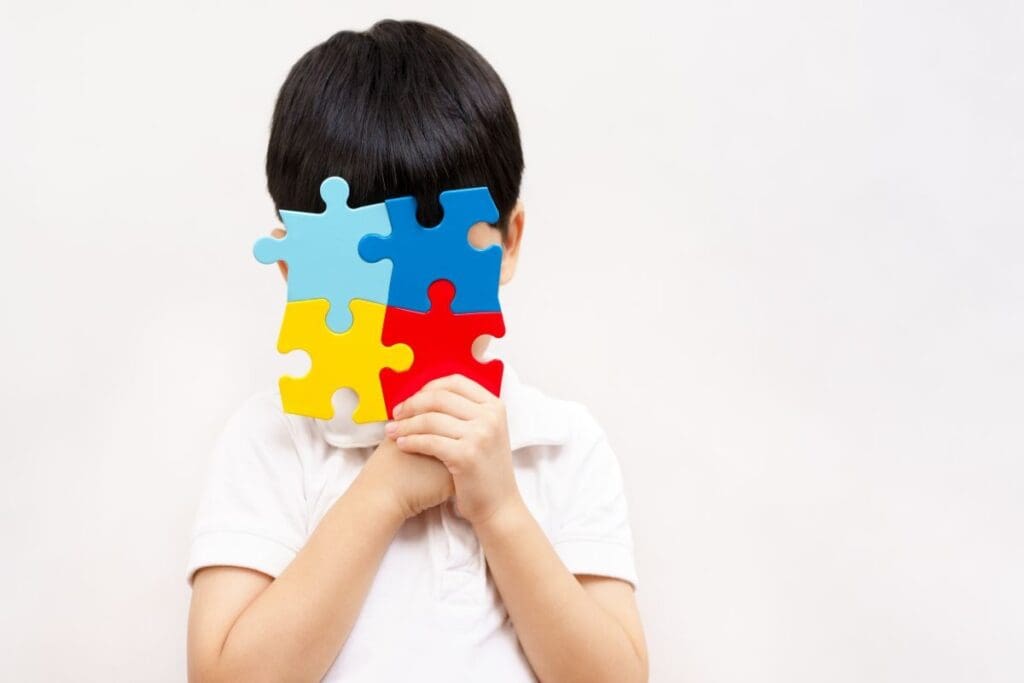Sleep disorders are very common in people with autism spectrum disorder (ASD). They are both a symptom and a big problem that often goes along with it.

Many with ASD have trouble sleeping. This can really affect how they do things every day. About 50-80% of autistic kids and teens have sleep problems.
We will look into how ASD and sleep issues are connected. We’ll talk about how common they are, how they affect people, and why they happen. Our goal is to help improve sleep for ASD patients by giving them the best care possible.
Key Takeaways
- Sleep disorders are common among individuals with ASD.
- Sleep disturbances can make autistic symptoms worse.
- Spotting and treating sleep issues early is key to a better life.
- Sleep problems can make daily tasks hard for ASD individuals.
- We need to offer detailed help to solve sleep issues in ASD patients.
The Relationship Between Autism and Sleep
Autism and sleep are closely linked, with many individuals facing sleep disorders. Studies show that 50% to 80% of kids and teens with ASD have sleep issues. This highlights the need to understand this connection better.

Sleep problems can vary, impacting daily life for those with autism. Research shows that autism may disrupt the body’s natural sleep cycle. This can lead to sleep issues.
Sleep Disorders as Symptoms vs. Comorbidities
It’s important to know if sleep disorders are part of autism or separate issues. Sleep disorders can be symptoms of autism or separate conditions needing their own care.
Figuring out if a sleep issue comes from autism or not is key. This helps choose the right treatments and manage ASD better.
Why Sleep Matters for Individuals with ASD
Sleep is vital for those with autism, affecting their behaviour, thinking, and social skills. Good sleep helps manage emotions, focus, and improves life quality for those with ASD.
Also, fixing sleep problems can help with autism’s other challenges, like behaviour and social skills. So, focusing on sleep is a big part of caring for those with ASD.
Prevalence of Sleep Problems in Autism Spectrum Disorder
Many people with Autism Spectrum Disorder (ASD) have trouble sleeping. Studies show that a large number of kids and teens with ASD face sleep challenges.
Research shows that 50% to 80% of autistic children and teens have sleep issues. This is much higher than the 20% to 30% of non-autistic kids who have sleep problems.

Statistical Comparison with Neurotypical Population
People with ASD sleep differently from those without it. They face more sleep disorders and severe sleep problems.
- Difficulty initiating sleep
- Frequent night wakings
- Early morning awakenings
- Sleep-disordered breathing
These sleep issues can really affect the lives of those with ASD and their families.
Age-Related Patterns in Sleep Disturbances
Sleep problems in ASD can happen at any age. But the type and how bad these problems are can change as people get older. Young kids might have trouble falling asleep, while older ones might have insomnia.
It’s important to know how sleep issues change with age. This helps create better sleep solutions for people with ASD at every stage of their life.
Common Sleep Disorders in People with Autism
People with Autism Spectrum Disorder (ASD) often face sleep disorders. These can make daily life tough. Sleep issues can make behavior worse and hurt school and learning. Common sleep problems include insomnia, night wakings, sleep-disordered breathing, and circadian rhythm disorders.
Insomnia and Difficulty in Falling Asleep
Insomnia is common in autism, making it hard to fall or stay asleep. This leads to daytime tiredness, hurting thinking, and behaviour. A bedtime routine and a good sleep space can help with insomnia.
Night Wakings and Sleep Maintenance Issues
Night wakings are when people wake up and can’t fall back asleep. This might be because of sensory issues or anxiety. Using white noise or relaxation techniques can help with night wakings.
Sleep-Disordered Breathing
Sleep-disordered breathing includes breathing problems while sleeping, like snoring or sleep apnea. People with autism might be more at risk. Doctors use sleep studies to diagnose this.
Circadian Rhythm Disorders
Circadian rhythm disorders happen when the body’s clock is out of sync with the day-night cycle. This is hard for people with autism, affecting their sleep and health. Getting natural light and keeping a regular sleep schedule can help.
Dealing with sleep disorders in autism needs a full plan. This includes behaviour changes, making the sleep space better, and sometimes medicine. Understanding and managing sleep issues can greatly improve life for those with autism.
- Behavioural Strategies: Establishing bedtime routines and relaxation techniques.
- Environmental Modifications: Creating a sleep-friendly environment.
- Pharmacological Approaches: Using medication under professional guidance.
Impact of Sleep Disturbances on Autism Symptoms
Research shows that sleep problems greatly affect those with autism. They can worsen behavioural issues, thinking skills, and talking abilities. Sleep disturbances can make autistic symptoms worse, making everyday life harder.
Effects on Behavioural Regulation
Sleep issues can really affect how individuals with autism behave. Without enough sleep, they might get angrier, have mood swings, and struggle to control their feelings. This can cause more and bigger behavioural problems, making it tough for caregivers.
But, fixing sleep problems can help. By setting regular sleep times and making a good sleep space, caregivers can lessen some autism-related behaviour issues. For more tips, check outthis resource onautism and sleep disorders.
Cognitive Function and Learning
Sleep is key for thinking and learning, even for those with autism. Good sleep helps you remember things and learn new stuff. Without enough sleep, those with autism might find it harder to learn and do daily tasks.
Also, sleep problems can mess with focus and planning skills. This makes it harder for them to stay on task and finish what they start. Helping with sleep can improve thinking and learning abilities.
Social Communication Challenges
Sleep issues can also hurt how well individuals with autism talk and connect with others. Not enough sleep can make them more anxious and less able to talk well. This can make them pull back and have trouble with friends and family.
But, focusing on sleep can help. By making sleep better, caregivers can help those with autism do better in social situations. This can lead to better relationships and feeling more connected.
Underlying Causes of Sleep Problems in Autism
Sleep issues in autism come from many places. These include brain, environment, and health factors. Knowing what causes these problems helps us find better ways to help people with Autism Spectrum Disorder (ASD) sleep better.
Neurobiological Factors
Brain issues are a big part of sleep problems in ASD. Studies show that parts of the brain that control sleep might not work properly. Also, imbalances in important chemicals like serotonin and melatonin can mess with sleep.
Changes in melatonin levels are linked to sleep issues in ASD. Melatonin helps us fall asleep and stay asleep. When it’s off, it’s hard to sleep well.
Sensory Sensitivities and Environmental Factors
Sensory issues and the environment also play a big role in sleep problems. People with ASD might find it hard to sleep because they’re too sensitive to things like light and sound. Things like not having a regular sleep schedule or using electronics before bed can make it worse.
It’s important to make a sleep-friendly environment. This means a dark, quiet room at a good temperature. Also, having a regular bedtime routine helps signal to the body that it’s time to sleep.
Medication Side Effects
Medicine side effects can also cause sleep problems in ASD. Some medicines for autism symptoms, like ADHD or anxiety, can affect sleep. They might make it hard to fall asleep or make you feel too sleepy.
It’s key for caregivers and doctors to watch how medicines affect sleep. They might need to change the medicine to help with sleep better.
By understanding and tackling the root causes of sleep issues in autism, we can find better ways to help people with ASD sleep better. This can greatly improve their quality of life.
Diagnosing Sleep Disorders in Individuals with Autism
Diagnosing sleep disorders in people with autism needs a detailed approach. It’s key to find the right treatment for both sleep problems and autism spectrum disorder (ASD).
Sleep Assessment Tools
There are many tools to help find sleep disorders in autism. These include:
- Sleep diaries: Keeping a detailed log of sleep patterns can provide valuable insights into sleep quality and disturbances.
- Actigraphy: This non-invasive method involves wearing a device that tracks movement, helping to assess sleep patterns over time.
- Polysomnography (PSG): An overnight sleep study that records various physiological activities while a person sleeps, providing detailed information about sleep stages and possible disruptions.
Using these tools with clinical checks helps doctors understand sleep issues in autism. Accurate diagnosis is the first step to managing sleep disorders well.
When to Seek Professional Help
If someone with autism has ongoing sleep problems, getting professional help is key. Signs that mean you should see a doctor include:
- Persistent trouble falling or staying asleep
- Frequent night wakings or restlessness
- Daytime tiredness or feeling very slow
Talking to a doctor who knows about autism and sleep can help figure out what to do next. Early intervention can greatly help improve life for those with ASD by fixing sleep issues.
Dealing with sleep issues in autism can be tough. But, with the right tools and professional advice, we can improve sleep and well-being for those on the autism spectrum.
Evidence-Based Interventions for Autism and Sleep Issues
Managing sleep disorders in Autism Spectrum Disorder (ASD) needs a mix of different approaches. It’s key to improve life quality for those with ASD.
Behavioural Strategies and Sleep Hygiene
Behavioural strategies are vital for asd sleep problems. A regular sleep schedule and bedtime routine help. Also, relaxation techniques and avoiding stimulating activities before bed enhance sleep hygiene.
- Establish a consistent sleep schedule
- Develop a calming bedtime routine
- Avoid screens and stimulating activities before bedtime
Environmental Modifications
Changing the sleep environment can greatly improve sleep quality. Make sure the bedroom is dark, quiet, and comfortable. Tools like white noise machines or blackout curtains can help.
“Creating a sleep-conducive environment is key for those with autism, as they’re more sensitive to their surroundings.”
Pharmacological Approaches
In some cases, pharmacological interventions are needed for sleep disorders in ASD. Medications like melatonin help regulate sleep-wake cycles.
Multidisciplinary Treatment Plans
A multidisciplinary approach is vital for managing sleep issues in ASD. It involves working together with healthcare providers, therapists, and family members. This creates a treatment plan that meets the individual’s needs.
By using these evidence-based methods, we can greatly enhance sleep quality and well-being for those with autism.
Conclusion
Understanding the link between autism and sleep disorders is key to helping those with Autism Spectrum Disorder (ASD). Sleep problems are common among people with autism. They can affect their daily life and overall happiness.
By tackling autism sleep issues, we can make a big difference. Our research shows that sleep problems are tied to how severe autism symptoms are. It’s vital to manage these sleep issues for good care.
To manage ASD and sleep well, we need a complete plan. This includes behaviour changes, making the environment better, and sometimes medicine. With a team effort, we can boost sleep quality. This, in turn, can improve thinking, behaviour, and social skills in those with autism.
FAQ’s:
Is a sleep disorder a symptom of autism?
Sleep disorders can be symptoms or related conditions of Autism Spectrum Disorder (ASD). We look into how sleep issues affect those with autism, impacting their daily life.
What is the prevalence of sleep problems in individuals with autism?
Many with autism face sleep issues, which can affect their daily life and health. Research shows these problems are more common in people with ASD than in typical people.
What are the common sleep disorders experienced by individuals with autism?
People with autism might have insomnia, night wakings, sleep-disordered breathing, or circadian rhythm disorders. These can greatly impact their behaviour, thinking, and overall health.
How do sleep disturbances affect autistic symptoms?
Sleep issues can make autistic symptoms worse. They can affect how someone behaves, thinks, and communicates. It’s important to understand this to help manage symptoms.
What are the underlying causes of sleep problems in autism?
Sleep issues in autism stem from many factors. These include neurobiological issues, sensory sensitivities, and side effects from medication. Knowing these causes helps in finding the right treatments.
How are sleep disorders diagnosed in individuals with autism?
Diagnosing sleep disorders in autism requires a detailed assessment. Accurate diagnosis is key to creating effective treatment plans and improving quality of life.
What are the evidence-based interventions for addressing sleep issues in autism?
Effective treatments include behavioural strategies, making environmental changes, and using medication. A team approach is best for managing sleep issues and improving well-being.
Can sleep problems in autism be treated?
Yes, sleep problems in autism can be treated. Understanding the causes and using targeted treatments can greatly improve life for those with ASD and their families.
How can I help my child with autism who is experiencing sleep problems?
Help your child by setting a bedtime routine, making their sleep space comfortable, and avoiding stimulating activities before bed. Also, talk to a healthcare professional for a personalized plan.
Are there any specific sleep hygiene practices that can help individuals with autism?
Yes, sticking to a regular sleep schedule, avoiding caffeine and screens before bed, and having a calming bedtime routine can help improve sleep for those with autism.
References:
- Chen, W., et al. (2020). The relationship between sleep disturbance and core symptoms in children and adolescents with autism spectrum disorder: A systematic review and meta-analysis. Journal of Autism and Developmental Disorders, 50(6), 2187-2200.https://doi.org/10.1007/s10803-019-04337-5
- Malow, B. A., et al. (2019). Sleep disorders in children and adolescents with autism spectrum disorder: A consensus report of the American Academy of Sleep Medicine. Journal of Clinical Sleep Medicine, 15(1), 163-176.https://doi.org/10.5664/jcsm.7606
- Goldman, S. E., et al. (2020). Melatonin and sleep in children with autism spectrum disorder: A systematic review. Sleep Medicine Reviews, 50, 101258.https://doi.org/10.1016/j.smrv.2020.101258
- Devnani, P. A., & Hegde, A. U. (2015). Autism and sleep. Journal of Pediatric Neurosciences, 10(4), 273-276.https://doi.org/10.4103/1817-1745.174413
- American Academy of Sleep Medicine. (2020). Sleep Problems in Children with Autism Spectrum Disorder. Retrieved fromhttps://aasm.org/clinical-resources/fact-sheets/autism-and-sleep/


































